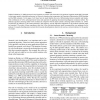4650 search results - page 5 / 930 » Generating and evaluating evaluative arguments |
FLAIRS
2007
13 years 9 months ago
2007
This paper addresses the issue of learning from communication among agents that work in the same domain, are capable of learning from examples, and communicate using an argumentat...
LREC
2010
13 years 9 months ago
2010
Schulte im Walde et al. (2008) presented a novel approach to semantic verb classication. The predicate argument model (PAC) presented in their paper models selectional preferences...
PRICAI
2000
Springer
13 years 11 months ago
2000
Springer
We describe a mechanism which recognizes a user's intentions from short-form rejoinders to arguments generated from Bayesian networks. The mechanism builds candidate reasoning...
ICAIL
2003
ACM
14 years 22 days ago
2003
ACM
In this paper, we introduce IBP, an algorithm that combines g with an abstract domain model and case-based reasoning techniques to predict the outcome of case-based legal argument...
EACL
2006
ACL Anthology
13 years 9 months ago
2006
ACL Anthology
We present and compare two approaches to the task of summarizing evaluative arguments. The first is a sentence extractionbased approach while the second is a language generation-b...


